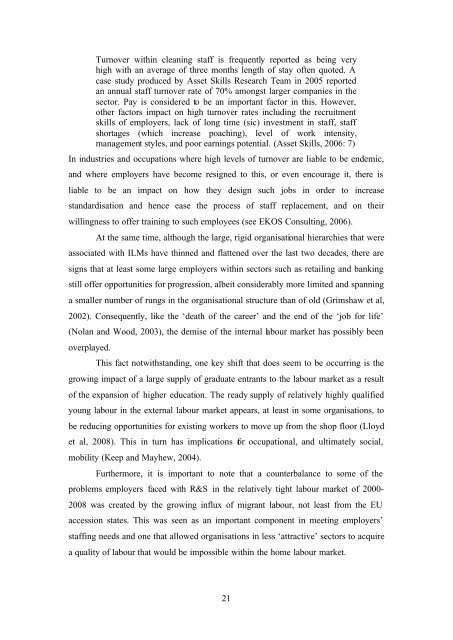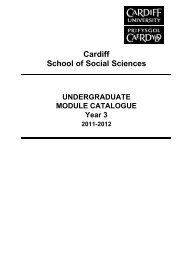Recruitment and Selection â the Great Neglected ... - Cardiff University
Recruitment and Selection â the Great Neglected ... - Cardiff University
Recruitment and Selection â the Great Neglected ... - Cardiff University
You also want an ePaper? Increase the reach of your titles
YUMPU automatically turns print PDFs into web optimized ePapers that Google loves.
Turnover within cleaning staff is frequently reported as being very<br />
high with an average of three months length of stay often quoted. A<br />
case study produced by Asset Skills Research Team in 2005 reported<br />
an annual staff turnover rate of 70% amongst larger companies in <strong>the</strong><br />
sector. Pay is considered to be an important factor in this. However,<br />
o<strong>the</strong>r factors impact on high turnover rates including <strong>the</strong> recruitment<br />
skills of employers, lack of long time (sic) investment in staff, staff<br />
shortages (which increase poaching), level of work intensity,<br />
management styles, <strong>and</strong> poor earnings potential. (Asset Skills, 2006: 7)<br />
In industries <strong>and</strong> occupations where high levels of turnover are liable to be endemic,<br />
<strong>and</strong> where employers have become resigned to this, or even encourage it, <strong>the</strong>re is<br />
liable to be an impact on how <strong>the</strong>y design such jobs in order to increase<br />
st<strong>and</strong>ardisation <strong>and</strong> hence ease <strong>the</strong> process of staff replacement, <strong>and</strong> on <strong>the</strong>ir<br />
willingness to offer training to such employees (see EKOS Consulting, 2006).<br />
At <strong>the</strong> same time, although <strong>the</strong> large, rigid organisational hierarchies that were<br />
associated with ILMs have thinned <strong>and</strong> flattened over <strong>the</strong> last two decades, <strong>the</strong>re are<br />
signs that at least some large employers within sectors such as retailing <strong>and</strong> banking<br />
still offer opportunities for progression, albeit considerably more limited <strong>and</strong> spanning<br />
a smaller number of rungs in <strong>the</strong> organisational structure than of old (Grimshaw et al,<br />
2002). Consequently, like <strong>the</strong> ‘death of <strong>the</strong> career’ <strong>and</strong> <strong>the</strong> end of <strong>the</strong> ‘job for life’<br />
(Nolan <strong>and</strong> Wood, 2003), <strong>the</strong> demise of <strong>the</strong> internal labour market has possibly been<br />
overplayed.<br />
This fact notwithst<strong>and</strong>ing, one key shift that does seem to be occurring is <strong>the</strong><br />
growing impact of a large supply of graduate entrants to <strong>the</strong> labour market as a result<br />
of <strong>the</strong> expansion of higher education. The ready supply of relatively highly qualified<br />
young labour in <strong>the</strong> external labour market appears, at least in some organisations, to<br />
be reducing opportunities for existing workers to move up from <strong>the</strong> shop floor (Lloyd<br />
et al, 2008). This in turn has implications for occupational, <strong>and</strong> ultimately social,<br />
mobility (Keep <strong>and</strong> Mayhew, 2004).<br />
Fur<strong>the</strong>rmore, it is important to note that a counterbalance to some of <strong>the</strong><br />
problems employers faced with R&S in <strong>the</strong> relatively tight labour market of 2000-<br />
2008 was created by <strong>the</strong> growing influx of migrant labour, not least from <strong>the</strong> EU<br />
accession states. This was seen as an important component in meeting employers’<br />
staffing needs <strong>and</strong> one that allowed organisations in less ‘attractive’ sectors to acquire<br />
a quality of labour that would be impossible within <strong>the</strong> home labour market.<br />
21
















